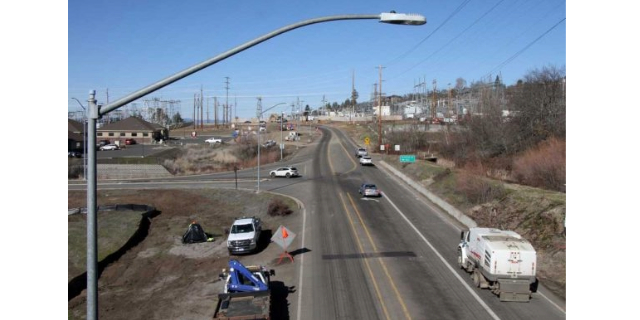ONE PAYCHECK AWAY: Comments on Supreme Court hearing homeless case miss the point
Published 9:00 am Sunday, May 5, 2024

- Members of the self-proclaimed "park watch" group protest on March 22 in Grants Pass.
As the senior housing director for AllCare Health based in Grants Pass, I have questions about what was said, but mostly about what wasn’t said, when the high court heard Johnson v. Grants Pass, a case that centered around the treatment of the unhoused in Josephine County’s biggest city.
Trending
Much of the discussion centered around the rights of cities to remove the homeless from public places where, by necessity, they may sleep and essentially live their lives. Little was said about the rights of the unhoused or how they came to be homeless.
We know the people behind Johnson v. Grants Pass. We tend to their wounds, which get worse because being homeless means it’s impossible to keep a wound dry and clean. We know what happens to people who cannot sleep, who get little food to sustain them and who walk 10 miles per day with a heavy backpack or cart to survive. We treat blisters that can lead to the the loss of a limb from infection. And we know that the terror and poor health of our unhoused members begin to be solved with a door that locks and a proper roof over their heads. And so, by the way, do the problems of communities who don’t want tent cities, understandably, in their towns.
The Grants Pass case centers around an ordinance in contention that stated that a person sleeping outside for any reason could not use a piece of cardboard, a blanket nor a pillow to protect themselves from the elements. Grants Pass experiences below-freezing temperatures in winter, frequent rain and ice and sometimes snow. If you are outside without a way to stay warm, that’s a death sentence. There is no emergency shelter in Grants Pass. There is nowhere else to be but outside if you don’t have a home to occupy.
Trending
What surprises me is the focus on the homeless as a problem rather than a reckoning about the causes of increasing homelessness, which is a result of systemwide failure in planning and strategy about housing.
Housing has gone from being considered a necessity, and therefore subsidized, to a market-based product subjected to the whims of investors. It’s become so absurd in Oregon that U.S. Sen. Jeff Merkley, D-Ore., has introduced a bill to stop hedge funds from buying homes.
The lack of housing is so extreme in Oregon that one must make $120,000 per year to buy a home without fear of foreclosure. For most people who didn’t buy a home 20 years ago, it’s too late. The fastest growing group of unhoused people are retirees surviving on Social Security checks, and right after them are children and families.
While we wring our hands about tent cities, wealth disparity goes from a fault line to a canyon. The unhoused are living in open-air prisons where any infraction, even sleeping, may land them in jail. If the courts rule against the homeless, it will not make homelessness vanish. No matter how many times you take a person’s tent or blankets, it does not make them housed.
What will solve homelessness, which most working people are a paycheck away from, is public policy that creates more housing at a price a regular person can afford. This won’t happen overnight, but it will happen because it must. In the meantime, we can offer practical solutions like a safe space for homeless people in places that accommodate them and the rest of our communities. We can do a better job of using empty spaces like the folks at the Mobile Integration and Navigation Team in Grants Pass who are using an old store for inside space, or pallet homes that can be situated around a working bathroom where a person may clean themselves as they do at Rogue Retreat.
There are answers, but none of them involve criminalizing the status of poverty.









